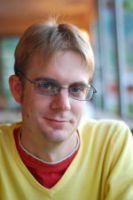Dr Chris Kempshall
Dr Chris Kempshall, Project Officer for East Sussex County Council's First World War Centenary Project, tells us what happened after his PhD
 How did you get your current job?
How did you get your current job?
I finished my PhD at Sussex in 2013 and my topic was relations between French and British soldiers during the First World War. It was good timing, as 2014-2018 marks the centenary.
Last June I started my job as the Project Officer for First World War centenary commemorations for East Sussex County Council. The Council hired me because my PhD research appeared not to have broken me. They liked that I could make quick decisions about pursuing leads, and could understand the value of sources. Also, my teaching experience made it easy for me to talk to a wide range of people. Once you’ve taught undergraduates early on a Friday morning, speaking to town councillors suddenly seems a doddle.
What does your job involve?
I project manage everything related to the First World War. We have a website and people in the area send us stories about their ancestors’ involvement in the war - it’s an online archive. I’m based at County Hall in Lewes, but only actually go there one or two days a month. I mainly work at The Keep or at home. Working from home is great, as I don’t have to wear a suit.
The Council treats me like a walking-talking encyclopaedia - I get involved in anything that’s history-related. As I’m the only person who knows this stuff, I get a lot of freedom. I can plan my own work and decide how long I need to spend at the archive that week, how many hours I’ll work at home. The PhD has trained me to work this way.
I regularly write 1,000-word stories for the website. This is easy, having written a 100,000-word thesis. It’s a fun way of using the material. It’s not that different from doing a PhD, but I get money at the end of the month - more money that I ever saw as an AT. This gives me security.
Are you involved in any other activities?
I’ve advised the BBC on centenary programming and website content. I’m also on the board of the Academic Advisory Group for the Imperial War Museum.
I still give talks, mostly unpaid, as it’s important for me to have a public profile. Also, what was the PhD for if I don’t share what I learned? These people actually want to hear what I have to say, too, unlike my friends who will change the subject after two or three minutes.
Do you have a top tip for doctoral researchers?
It’s a good idea to start thinking about what you’re going to do after your PhD. But don’t lose sight of the fact that you have to actually finish it before you can move on to the next stage.

